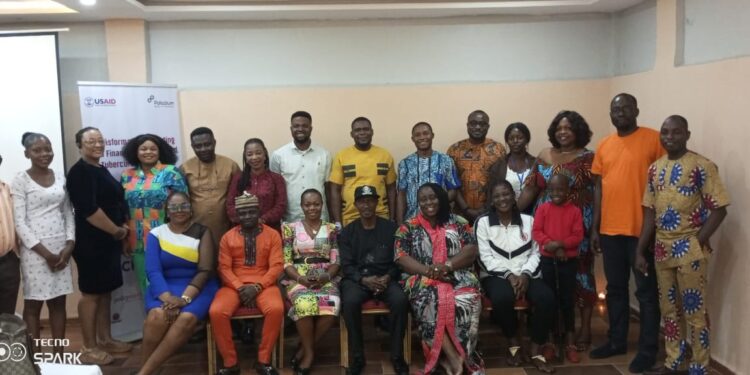Chinedum Treasure
Health professionals and other stakeholders in Anambra State have expressed worry over burden of tuberculosis in the State.
They however pledged their preparedness to work collectively towards reducing the burden.
While Nigeria ranks number six in the world and number one in Africa, with every local government having TB cases, Anambra has the highest burden of TB drug resistance cases and childhood TB contribution in the South-East and the country at large.
Speaking during a one-day Stakeholders Roundtable Discussion on Unlocking Funding for TB interventions, Head, Monitoring, Evaluation and Learning, Fund TB Cluster, Faith Paulinus said the engagement was to highlight demand for transformative budgeting which would lead to increased funding for TB.

The meeting was organized by Fund TB Cluster anchored by Policy Alert and partnered with the Palladium Group under the Strengthening Civic Advocacy and Local Engagement (SCALE) project, funded by USAID.
Paulinus said, “There’s still seventy percent gap in TB funding and the little we are doing is also donor-driven. So, if funders pull out, there will be problems.
“Anambra State has done considerably well compared with other states in South East and South-South regions. The fourth quarter 2023 implementation report shows that Anambra spent 21 million out of 50 million budgeted for TB intervention in the state. But, there’s room for improvement.
“We will hold everyone accountable for the commitment expressed here. We want to see that ten percent of 50 million allocated for TB programming is being released before the end of the year. The CSOs should be ready to work towards achieving this. We equally want to see robust private sector engagement.”
Earlier, Ogechukwu Ozoemena, Project Manager, Gender Perspective and Social Development Centre, (GPSDC), which executes the project in the State, said the
meeting was intended to enhance and sustain domestic investment for TB interventions, aiming to bridge the substantial 70% funding gap required to effectively manage TB in our state.
“We’re here today to share insights, strategies and efforts towards achieving the goal of Fund TB project in the area,” Ozoemena said.
Coordinator, State TB Control, Dr Ugochukwu Chukwulobelu regretted that inadequate funding had stalled the speed of TB interventions.
Chukwulobelu, represented by Monitoring and Evaluation Officer, Chiamaka Oguejiofor said, “Funding determines how far we can go. We have CBOs who penetrate those hard to reach areas in search of TB cases. But, we are hoping that if funds are available, we will do much more than we are doing now”.
Also speaking, Executive Director, Anambra State AIDS Control Agency, ANSACA, Johnbosco Nkem Ementa, represented by the Program Lead/Gender and Human Rights State Response Team Desk Officer, Ifeanyi Cyril restated his organization’s continued support to TB patients.
State Coordinator of TB Network, Ify Unachukwu stressed the place of private sector involvement, which, she said had proved effective in addressing challenges in the health sector, while representative of the private sector, Ikechukwu Agwuilere of Dozie Oil, expressed their willingness to partner with government to halt the spread of tuberculosis in the State.
Managing Director, Anambra State Health Insurance Agency, (ASHIA), Dr Simeon Onyemaechi, represented by Medical officer, Dr Sought out Okechi, said arrangements have reached advanced stage with the Global Fund towards enrolling over 20,000 TB patients into the health insurance scheme for better treatment.
Director, Planning in the Ministry of Economic Planning and Budget, Arthur Iwuanya, called for close working relationship between the implementing NGO and relevant government institutions to achieve improved budgeting and releases for tuberculosis in the state.
“Liaise with Dr Chukwulobelu who coordinates the state’s TB control program so that they will effect the increase in their budget for 2025. That way, it will enjoy green light bilateral discussions which start very soon”.
For her part, State Health Financing Officer, Chizoba Mbanefo, argued that ensuring more releases for TB is more impactful than just raising the budgetary allocations without commensurate releases. “But, we must be able to present something backed with relevant data and figures. Let’s task the TB campaigners to develop a policy brief which can be presented to the governor for his buy in”.

Speaking on behalf of the civil society, the Program Officer, Save the World Support Foundation (SAWOR), Chima Asomba, stressed the need to bridge the knowledge gaps about TB in the communities while advocating training and retraining of those implementing interventions especially at the DOT centres. “Also, training must be sustained. We must also increase the sensitization to deal with the issue of self stigma”.
Executive Director, GPSDC, Eucharia Anekwe, I am happy about the intervention. There are a lot of myths about tuberculosis. Most people do not know that it is infectious. Yes, we are talking about improving domestic funding but that is not enough without sensitization. This project will bring the messages about TB, its symptoms and every other thing to the grassroots.
On the part of the government, they have relaxed for too long leaving everything to the donors. But, I am happy that most of the inhibiting factors have been addressed. Ministries of Health, Economic Planning and Budget, ANSACA, Primary Health Care Development Agency, ASHIA are all here and have made commitment towards improved funding for TB in the state.
“I am happy that they also agreed to the need for private sector engagement and incidentally, the private sector was equally represented here and the representative also gave his commitment. I am excited about the outcome of this event today,” Anekwe concluded.






